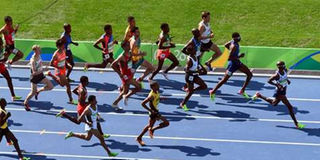5,000m: This is Kenya’s greatest shame since the 60s

Mo Farah (right) of Britain leads the pack during the men's 5000m heats of the Rio 2016 Olympic Games Athletics, Track and Field events at the Olympic Stadium in Rio de Janeiro on August 17, 2016. PHOTO | BERND THISSEN |
What you need to know:
- Several officials have in the past been indicted for abuse of office, including misappropriating funds... Nothing happened to them.
- That is a good clue about what will happen next
- This week, to national consternation, Kenya failed to qualify for the 5000 metres Olympic final.
IN RIO DE JANEIRO
In an irony of Olympian proportions, the man who started the illustrious career of our 5000 metres race in Mexico City in 1968 sits atop a discredited National Olympic Committee that is now viewed more of an obstacle than a facilitator in Kenya’s quest for glory here.
Kipchoge Keino, the 76 year-old tall, grandfatherly, soft-spoken and newly-feted Olympic laureate has a humility that masks calculation and ruthlessness.
Anybody who could rise from a lowly ranked policeman to his dominant position as chairman of Nock couldn’t do it without knowing how to see off opponents.
And whether he is an orchestrator or detached bystander amidst Nock’s rampant culture of tribalism, cronyism and favouritism remains an open question.
Whatever the answer is, these negatives have cost Kenya big. They have short changed a nation so rich in talent and saddled it with incompetent people who should not be managing world class athletes in the first place.
This week, to national consternation, Kenya failed to qualify for the 5000 metres Olympic final.
Reaction from home reaching here had Daniel Komen saying that he wished he could come back from retirement. I empathised with him. Of the 25 best athletes in the world who have ever run this race, Komen holds our best time – 12 min 39.74 seconds.
Fully 13 of these 25 are Kenyans compared to only six from Ethiopia underlining our country’s dominance in this distance over the decades.
But how did Kipchoge, aloof, self-assured, basking in the prestige of being a distinguished member of the Olympic family and wearing an inscrutable face, take it? I have not been able to get his reaction which would doubtless be interesting because he is the father of the 5000 metres race tradition in Kenya.
Kenya had featured in the finals of the two previous Games, Rome 1960 and Tokyo 1964, but in Mexico City, Kipchoge returned a time of 14 min 05.2 seconds to win a silver medal for Kenya, the nation’s first in this race.
The late Naftali Temu, whose victory in the 10,000 metres made him our first Olympic gold medallist, followed in Kipchoge’s wake, clocking 14 min 06.4 seconds. Since then, the 5000 metres has always been a medal prospect for Kenya.
John Ngugi won the 5000 metres gold medal in Seoul, in 1988. In the following two Olympiads, Barcelona 1992 and Atlanta 1996, Paul Bitok won a silver medal. Eliud Kipchoge, who had won a bronze in the 2004 Games in Athens went one better with a silver in Beijing, 2008.
CONSPIRANCY OF SILENCE
Apart from Temu and Eliud Kipchoge, our other Olympic bronze medallists have been Edwin Soi and Thomas Longosiwa in Beijing and London respectively.
Many Kenyans are rightfully asking what has gone wrong. But they must understand Kenyan workplace culture, of which Nock is a part. It doesn’t matter whether one is in Nairobi or Rio de Janeiro, the culture is the same.
You can get bad news only from disaffected parties, and then only when they have lost everything and talking to the media is their only hope of salvaging something.
Unless somebody has broken free of the fraternity, he or she will tell you things are good even when they are not. It is a conspiracy of silence driven by a heightened sense of self-preservation.
The badly treated John Anzrah spoke up only when he was sent home after Nock’s bungling burst open like a suit case. He would not otherwise have spoken up, despite not having been issued with an accreditation pass and yet he is a coach.
Trying to work inside an Olympic facility while not being accredited is like trying to make an international flight without a passport. Leaders of Team Kenya thought this was possible.
I have interacted with several officials of Team Kenya and the stock answer to my queries, even on the promise of confidentiality, is the same: things are okay. It will thus take the good luck of disasters such as happened upon Maj. (Rtd) Mike Rotich, who couldn’t run Eldoret Club before being asked to manage the Kenya Olympic team, to dig out the rot at Nock. It won’t come out by itself.
John Anzrah’s fate, and the terrible failure to qualify for the 5000 metres final is the latest in this string of disasters. To understand what will happen next, we must look at what happened before.
Several athletics officials have in the past been indicted for abuse of office, including misappropriating public funds. Some were accused of carting away for personal use kit meant for team members.
Nothing happened to them. That is a good clue about what will happen next.





